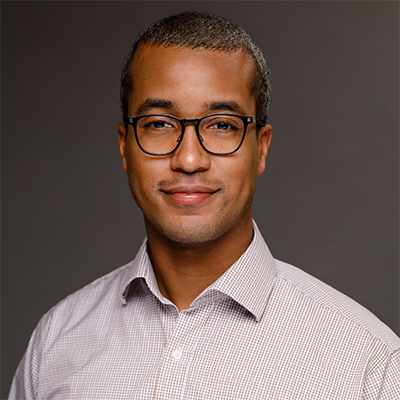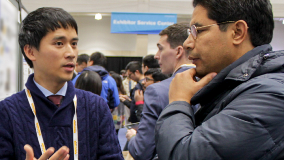Zakaria Al Balushi, University of California, Berkeley
Candidate for Board of Directors
 Zakaria Al Balushi is an Assistant Professor in the Department of Materials Science and Engineering at the University of California, Berkeley since 2019. He received his B.S. (2011), M.S. (2012) in Engineering Science, and Ph.D. (2017) in Materials Science and Engineering from the Pennsylvania State University. After completing his Ph.D., Zakaria held the Resnick Prize Postdoctoral Fellowship in Applied Physics and Materials Science at the California Institute of Technology. At UC Berkeley, Zakaria leads a research group that focuses on the synthesis of electronic materials thin films and nanostructures using a variety of vapor phase and solution processing techniques. His team is dedicated to creating novel, large-scale, manufacturable crystal growth, processing, and integration schemes for emerging electronic and quantum materials for device applications.
Zakaria Al Balushi is an Assistant Professor in the Department of Materials Science and Engineering at the University of California, Berkeley since 2019. He received his B.S. (2011), M.S. (2012) in Engineering Science, and Ph.D. (2017) in Materials Science and Engineering from the Pennsylvania State University. After completing his Ph.D., Zakaria held the Resnick Prize Postdoctoral Fellowship in Applied Physics and Materials Science at the California Institute of Technology. At UC Berkeley, Zakaria leads a research group that focuses on the synthesis of electronic materials thin films and nanostructures using a variety of vapor phase and solution processing techniques. His team is dedicated to creating novel, large-scale, manufacturable crystal growth, processing, and integration schemes for emerging electronic and quantum materials for device applications.
Zakaria serves on the editorial board of Communications Materials and was previously a Principal Editor for the Journal of Materials Research (JMR). He also acted as a Guest Editor for the 2020 JMR Special Issue on "Heterogeneity in Beyond Graphene 2D Materials.". Zakaria has organized six MRS symposiums on the topic of "Beyond Graphene 2D Materials," and recently served as Meeting Chair for the International Materials Research Congress (IMRC) in 2023, held in Cancun, Mexico. His contributions to the field have been recognized with numerous awards, including the MRS Graduate Student Gold Award in 2016, the NSF CAREER Award, and the Micron Corporation Early Career Award in 2022.
Candidate's Statement
As a candidate for the Board of Directors of the Materials Research Society (MRS), I am driven by a vision to expand our society’s reach, foster interdisciplinary collaboration, and address the pressing challenges of our time through innovative materials science. The MRS has been an integral part of my journey since I joined as an undergraduate. Attending these conference meetings over the years has profoundly shaped me as a scientist, contributing significantly to my personal and professional growth.
Our society stands at a pivotal moment, and I believe that through our collective efforts, we can harness new frontiers in technology and sustainability. By focusing on solving the most urgent problems, such as addressing climate change through sustainable materials and technologies and leveraging the power of artificial intelligence to accelerate innovation in energy efficiency, carbon capture, and renewable energy sources, we can make significant strides in creating a more sustainable and resilient future.
The MRS has long been a leader in advancing materials research, but we must now take bold steps to engage the broader global community. By expanding our membership to include diverse groups, for example, extending MRS chapters to community colleges and technical trade schools, as well as fostering cross-collaborations with other research societies and foundations, we can tap into a wealth of untapped potential. This diversification will not only enrich our scientific endeavors but also strengthen our global impact as a community. Moreover, managing the costs of our conferences and other activities is crucial, particularly to ensure we can continue to welcome new members from communities all over the world. I am committed to exploring innovative solutions to make our society more sustainable in all aspects—from our meetings to our publications. By adopting eco-friendly practices and leveraging technology, we can lead by example in the scientific community.
Our community has the expertise to address sustainability through materials design and function. Additionally, we must prioritize environmental sustainability, material-human interplay, and enhancing human health and happiness through advanced materials. As a member of the Board of Directors, I will champion these initiatives and work tirelessly to position the MRS as a leader in addressing global challenges through materials design. Together, we can pave the way for a brighter, more sustainable future.

